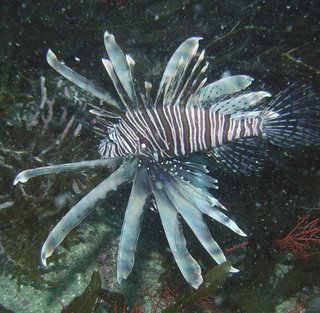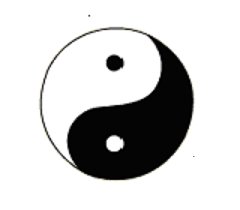We dived the sub on Easter Sunday. By “the sub” I mean the U-352, sunk in 1942, scuttled by her captain after battle with the Coast Guard cutter Icarus. If it’s not the premiere dive site in North Carolina, it is certainly near the top. She lays partially buried in the sand under about 115 feet of water some 30 miles out from Beaufort. Once a machine of war, she is now a vibrant marine ecosystem, her resurrection a miracle to compare with any that might be celebrated on the day.
There is not much I can say about the site that hasn’t been said before. Pictures are easy to find (which is a good thing, as I forgot my camera, but the current was so strong that this might have been more blessing than curse); you can see her from my vantage point at the gun emplacement looking to stern, her conning tower listing to starboard. Though she still has the shape of a submarine, you can almost be forgiven for forgetting that she was designed as an engine of death when you see how life has enveloped her. In truth, the only death she dealt in her earlier incarnation was to fourteen of her sailors, killed in her battle with Icarus.
It is also easy to forget (or ignore) as you swim through her gardens that she is a grave. Like all graves, she has been overtaken by the very nature that we seek to defeat in our funerary practices. This day there is abundant coral and plant life attached to her pressure hull. Tuna and amberjack swim past, oblivious to the follies of history. A large grouper has taken up residence inside her, seeking respite from the current in the detritus of the tides of time. Everywhere we look life triumphs over death.
There is not much I can say about the site that hasn’t been said before. Pictures are easy to find (which is a good thing, as I forgot my camera, but the current was so strong that this might have been more blessing than curse); you can see her from my vantage point at the gun emplacement looking to stern, her conning tower listing to starboard. Though she still has the shape of a submarine, you can almost be forgiven for forgetting that she was designed as an engine of death when you see how life has enveloped her. In truth, the only death she dealt in her earlier incarnation was to fourteen of her sailors, killed in her battle with Icarus.
It is also easy to forget (or ignore) as you swim through her gardens that she is a grave. Like all graves, she has been overtaken by the very nature that we seek to defeat in our funerary practices. This day there is abundant coral and plant life attached to her pressure hull. Tuna and amberjack swim past, oblivious to the follies of history. A large grouper has taken up residence inside her, seeking respite from the current in the detritus of the tides of time. Everywhere we look life triumphs over death.
I cannot imagine what life was like for the crew. They lived every day for months in a steel tube, the bounds of their world measuring 164 feet long by 15 feet wide, the cold of the deep water seeping through the walls. The air must have been laden with the smell of urine and feces, diesel and unwashed men. They must have endured the constant fear of attack, as frightened perhaps as their potential victims since depth put them at greater risk, living with the knowledge that to surface for air made them vulnerable, that in seeking life they courted death. I point this out not to engender sympathy for their cause but compassion for fellow humans. The first casualty of war is truth; the second the humanity of the enemy.
I can know the names of the men who lived and died here. I have read the reports of her sinking and of the interrogation of the crew. I can visit the grave of Maschinenobergefreiter Gerd Ruessel, aged 20 years, who died on Icarus of his injuries, at the Beaufort National Cemetery. Yet except for their captain, Hellmut Rathke, I can know little about their political persuasions, the reasons they fought. Rathke, for his part, was affected by the madness that consumed his country and I am not sorry he was forced to abandon his vessel.
Of the others, and the fifteen dead, I can know or say very little. Perhaps they were simply patriots, fighting for their home and their kin. Some among them almost certainly agreed with the aggressive course their leaders had charted. Just as certainly, there were those among them who would have preferred to be somewhere else, anywhere else, but had little choice in the matter. If the survivors spoke of these things, they may yet be known, but no one can truly speak for the dead. We can know only their names and that the oldest among them was 27, the youngest 18, young men sacrificed upon the altar of ego and bloodlust by their elders, who should have known better.
It is always this way. Old men send young men to die for their fevered dreams of glory and conquest, having learned the same from their fathers like abused children growing up to hurt their own.
I don’t know how the other divers felt that day. It was easy at the moment to surrender to the natural beauty of the place, so simple to believe that this was merely a submarine-shaped reef. One could take pride in the descent to that depth and in the ability to battle the current. In the moment, I was largely concerned with the dive and in seeing as much as conditions and limited bottom time allowed. Yet an idea struggled to be born, and since I could not take a picture I took a lesson instead.
I am not a pacifist. I concede that until (unless) we move past the pettiness that is oft our trademark, machines such as this one will be required to defend against the malicious, the mad, and their machines such as this one. But we would do well to mark sites such as this, to listen to the stories they have to tell. Dreams of empire seldom survive awakening and all works of men eventually crumble. True power, it seems, lies not in the ability to destroy or conquer, but in endurance. Monuments to hubris inevitably surrender to entropy and even swords beaten into ploughshares will turn to rust. All our engines of war are ultimately overtaken as nature, indifferent to the failure or success of her troublesome children, asserts her sovereignty.
I can know the names of the men who lived and died here. I have read the reports of her sinking and of the interrogation of the crew. I can visit the grave of Maschinenobergefreiter Gerd Ruessel, aged 20 years, who died on Icarus of his injuries, at the Beaufort National Cemetery. Yet except for their captain, Hellmut Rathke, I can know little about their political persuasions, the reasons they fought. Rathke, for his part, was affected by the madness that consumed his country and I am not sorry he was forced to abandon his vessel.
Of the others, and the fifteen dead, I can know or say very little. Perhaps they were simply patriots, fighting for their home and their kin. Some among them almost certainly agreed with the aggressive course their leaders had charted. Just as certainly, there were those among them who would have preferred to be somewhere else, anywhere else, but had little choice in the matter. If the survivors spoke of these things, they may yet be known, but no one can truly speak for the dead. We can know only their names and that the oldest among them was 27, the youngest 18, young men sacrificed upon the altar of ego and bloodlust by their elders, who should have known better.
It is always this way. Old men send young men to die for their fevered dreams of glory and conquest, having learned the same from their fathers like abused children growing up to hurt their own.
I don’t know how the other divers felt that day. It was easy at the moment to surrender to the natural beauty of the place, so simple to believe that this was merely a submarine-shaped reef. One could take pride in the descent to that depth and in the ability to battle the current. In the moment, I was largely concerned with the dive and in seeing as much as conditions and limited bottom time allowed. Yet an idea struggled to be born, and since I could not take a picture I took a lesson instead.
I am not a pacifist. I concede that until (unless) we move past the pettiness that is oft our trademark, machines such as this one will be required to defend against the malicious, the mad, and their machines such as this one. But we would do well to mark sites such as this, to listen to the stories they have to tell. Dreams of empire seldom survive awakening and all works of men eventually crumble. True power, it seems, lies not in the ability to destroy or conquer, but in endurance. Monuments to hubris inevitably surrender to entropy and even swords beaten into ploughshares will turn to rust. All our engines of war are ultimately overtaken as nature, indifferent to the failure or success of her troublesome children, asserts her sovereignty.







